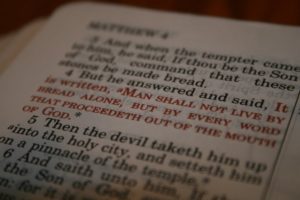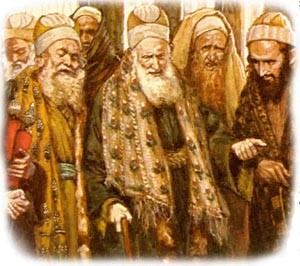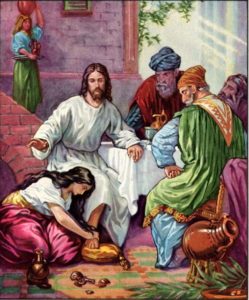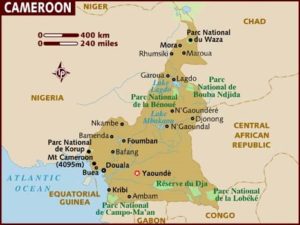OLD TESTAMENT READING: Deuteronomy 7-8:20
The Book of Deuteronomy is quoted more than 80 times in the New Testament. The early church found it to be very significant.
In this Book, the people of God are being called to remember what God has done and what God has said before they go into the Promised Land.
In Chapter 7, they told to never forget God’s grace.
Israel had become a mighty nation. Its army now numbered 600,000 fighting men. There was a danger that they could think that God chose them because they were strong in number.
Israel is called and chosen by God not because of their past performance, present abilities or future potential, but because of His grace alone. The clear New Testament message of salvation by grace alone, through faith alone, in Christ alone, is anticipated in verse 7-
Deuteronomy 7:7-8 (NASB) 7 “The LORD did not set His love on you nor choose you because you were more in number than any of the peoples, for you were the fewest of all peoples, 8 but because the LORD loved you and kept the oath which He swore to your forefathers, the LORD brought you out by a mighty hand and redeemed you from the house of slavery, from the hand of Pharaoh king of Egypt.
How can you explain God’s grace? God’s free pardon and favor is lavished upon us because of the person and work of Christ. Someone came up with an Acronym for “grace” – Greatest Riches At Christ’s Expense. God’s favor was set upon the Israelites because of His sovereign love and grace and the fact that He was keeping an oath made with Another. In Deuteronomy Moses refers to the covenant God made with Abraham. But it is through the Seed of Abraham, Jesus Christ, that God finds the perfect obedience that qualifies for the covenant blessing of life forevermore.
In the New Covenant of God’s grace God lavishes His love upon us and gives us the blessing of a new life, a new heart and a desire to live unto Him. We receive the New Covenant blessings, not because of our obedience, but because of the obedience of God’s Son. Jesus is the Testator in this New Testament and His inheritance is shared with those who believe on Him.
Moses repeats the mandate that there be no compromise with the seven Canaanite nations. The Lord was going to bring judgment upon them and use Israel as His means of doing so.
God is loving and merciful, but He is also just. He is the Creator of the Canaanites as well as the Israelites. He is also their judge. God brought judgment on the Israelites for their disobedience, by having all of the original ‘exodus generation’ perish in the wilderness, with the exception of Joshua and Caleb. So also the Canaanites who were given warning but continued in sin were to be judged by being conquered by the Israelites.
In the Book of Genesis, the Lord told Abraham that his descendants would be afflicted as strangers in a strange land for four hundred years. This was fulfilled as Jacob and his sons moved to Egypt when Joseph was promoted to become Pharaoh’s right-hand man. God said He would bring them out of Egypt as a great nation and they would return to the Promised Land- “for the iniquity of the Amorites is not yet full” (Genesis 15:16). God was giving the Canaanite nations opportunities to repent but they continued in their iniquity until God could bear it no longer. It had come to the point of fullness- the point of no return. It was at this time, when the Israelites were ready to cross the Jordan River, that the seven Canaanite nations (the Hittites, Gergashites, Amorites, Canaanites, Perizzites, Hivites and Jebusites) were to be judged.
There is a practical application in that the enemies of our souls must be dealt with. The grace that saves us also teaches us to say ‘no’ to ungodly influence.
Titus 2:11-12 (NASB) 11 For the grace of God has appeared, bringing salvation to all men, 12 instructing us to deny ungodliness and worldly desires and to live sensibly, righteously and godly in the present age,
The iniquity of the nations had been filled to the brim and the time had come to deal with it. Although in the historical context this was a physical battle against flesh and blood enemies, we know that today God’s people war against the fleshly desires as well as unseen spiritual forces of darkness, wicked powers and principalities.
Ephesians 6:12 (NASB) 12 For our struggle is not against flesh and blood, but against the rulers, against the powers, against the world forces of this darkness, against the spiritual forces of wickedness in the heavenly places.
The instructions were clear. There is to be no compromise. “God is Light, and in Him there is no darkness at all. 6 If we say that we have fellowship with Him and yet walk in the darkness, we lie and do not practice the truth” (1 John 1:5-6).
In this good fight of faith, “We are destroying speculations and every lofty thing raised up against the knowledge of God, and we are taking every thought captive to the obedience of Christ” (2 Cor 10:5). We are to make no treaties with darkness. We are to show no mercy to sin in our lives, but by the Spirit we are to put every hint of sin to death (Romans 8:13; Colossians 3:5).
The susceptibility of our hearts to deception is made clear when the Lord forbids marriage with pagan neighbors. We are to break down the pagan altars in our lives (naturalism, romanticism, humanism, materialism, eroticism, transcendentalism, and all the ‘isms’ that exalt themselves against truly knowing God through Jesus Christ). He is to be preeminent over all.
Deuteronomy 7:22 (NASB)
22 “The LORD your God will clear away these nations before you little by little; you will not be able to put an end to them quickly, for the wild beasts would grow too numerous for you.
We need to be reminded that our progress in holiness is “little by little”. Conformity to Christ does not happen overnight. It takes time. There are remaining enemies to contend with. And they don’t always show themselves. Through our daily battles with temptations and trials we grow stronger and are further equipped to be able to handle greater responsibilities and take on new territory.
God’s faithfulness to deal with His children.
In Chapter 8, Moses reminds the Israelites that God has been dealing graciously with them. The process of sanctification involves growing in our understanding of ourselves and our need for His life. We need to grasp the fact that our hearts are deceitful and incurably wicked, infected with the family trait of Adam’s unbelief (Jer. 17:9). God allowed His people to be weaned off their former ‘slave food’ diet that they had while living in Egypt, that they might hunger for God’s ‘salvation food’ and appreciate Who He is and what He has done.
Deuteronomy 8:3 (NASB)
3 “He humbled you and let you be hungry, and fed you with manna which you did not know, nor did your fathers know, that He might make you understand that man does not live by bread alone, but man lives by everything that proceeds out of the mouth of the LORD.
What kind of food are you feeding on?
Where Israel failed to trust God during their 40- year trek through the wilderness, Jesus succeeded in his 40 days in the wilderness. When tempted by Satan to command the stones to be made bread, Jesus retorted by quoting Deuteronomy 8:3:
“Man shall not live by bread along; but by every word that proceeds out of the mouth of God” (Matthew 4:4).
Jesus did not resort to making his own initiatives. He lived with a moment by moment fellowship of obedience with the Father.
A question that we should be asking as God brings us through any particular circumstance is- “Lord, what is it that you want to teach us?”
The theme of Deuteronomy is to remember! Remember where you came from! Remember what God has done. He has delivered you from slavery to sin and death. Remember His holy law and His gracious provision through the Tabernacle which foreshadows the perfect work of redemption to be provided through our Lord Jesus Christ. Forget not His presence and power in your midst. Forget not His daily benefits (Psalm 103:2).
A good time to remember God’s blessings is when we sit down at a table for a meal. Never forget to be thankful.
“When you have eaten and are satisfied, you shall bless the LORD your God for the good land which He has given you.” (Deuteronomy 8:10)
NEW TESTAMENT READING: Luke 7:36-8:3
The Pharisees continually misread Jesus. Their eyes were blinded by a veil of private interpretation of the letter of the law and their religious expectations. They could not see that the glory of God that fulfills the law was right before them in the person of Jesus of Nazareth. Not only was Jesus the New and Living Torah, the revelation of God’s righteousness incarnate, but He was all that the Tabernacle prophesied of a redeeming work that would reconcile sinners to a holy God. He had come to fulfill the commandments of God, but also the laws of the sanctuary- to save His people from their sins.
Jesus was dining with Simon, a Pharisee, when a woman who had a reputation for being a sinner came into the house with an alabaster vial of costly perfume. She broke it, and then anointed and kissed His feet, washing them with her tears. The Pharisee’s religious sensibilities were offended. Simon presumes that Jesus is no prophet because He seems to not recognize that she is a known sinner.
Jesus, knowing the Pharisees thoughts, told Simon a story of a moneylender who had two debtors. One had a large debt and the other a small one. The moneylender forgives both debtors. Which one would love the moneylender more? Simon replies, “I suppose the one whom he forgave more” (Luke 7:43).
Jesus affirms Simon’s answer while lovingly rebuking him for his lack of discernment. Simon had misjudged Jesus, the woman, and himself. Jesus was more than a prophet, He was God and had the power to forgive sins. The woman knew she was a sinner and recognized forgiveness coming from God through Jesus. She had saving faith- faith in a Savior. Simon had yet to see that his own sin-debt was keeping him from a relationship with the one true God who that day had come to dine in his house.
READING FROM PSALMS: Psalm 69:1-18
Psalm 69 is a cry of distress. The Psalmist is experiencing deep suffering. He is hated without a cause (v.4). Jesus applies these words to Himself in John 15:25.
John 15:25 (NASB) 25 “But they have done this to fulfill the word that is written in their Law, ‘THEY HATED ME WITHOUT A CAUSE.’
The Psalmist is bearing the Lord’s reproach (v.7,9). He does not want to be a stumbling block to those who wait upon the Lord (v.6).
The disciples recall Psalm 69:9 when they see Jesus overturning the tables in the temple courts.
John 2:17 (NASB) 17 His disciples remembered that it was written, “ZEAL FOR YOUR HOUSE WILL CONSUME ME.”
In Matthew 27:48, Mark 15:36, Luke 23:36, and John 19:28 Jesus is offered sour wine to drink, perhaps wetting his lips so He could cry out it is finished.
Psalm 69:21 (NASB) 21 They also gave me gall for my food and for my thirst they gave me vinegar to drink.
A question often raised when reading Psalm 69 is: “Isn’t the Psalmist’s call for retribution on his enemies anti-gospel?”
Psalm 69 is an individual lament. It is attributed by most scholars to David. He is experiencing persecution and agonizing circumstances. He asks that God would vindicate the honor of His Name, calls out for grace, magnifies God’s attributes of love, mercy and faithfulness and yet calls for retribution on his enemies. Psalm 69 is one of the imprecatory psalms that call for the Lord’s vengeance.
In the New Testament we have a Greater David. From the agony of the cross, He cries out to God, “Father forgive them, they know not what they do.” This conveys God’s heart. The same God who offers forgiveness, promises judgment upon those who reject His offer of it. For it is only through the cross that a holy God can pardon sin.
D.A. Carson comments, “The gospel announces the dawning of the kingdom, the coming of the king, especially focusing on his cross and resurrection, to redeem a fallen and rebellious people to God- but the entailment of this news is catastrophic judgment on those who spurn Him….The same Jesus who cries “Father, forgive them” also pronounces blistering denunciations of assorted spiritual hypocrites (Matthew 23). The ultimate retaliation at the end is not glossed over in the New Testament (Revelation 19).” (The Gospel Coalition Blog July 10, 2011)
READING FROM PROVERBS: Proverbs 12:1
Proverbs 12:1 (NASB) 1 Whoever loves discipline loves knowledge, but he who hates reproof is stupid.
The truth is we can learn much from discipline. We should be eager to be warned and corrected. Discipline reminds us that there is more that we need to know. Learn from it.
PRAYER FOR THE NATIONS: Continuing to pray for CAMEROON
(from Operation World, p. 192-193)
The Joshua Project lists 15 people groups that are not being reached in Cameroon.
Other major challenges:
Muslims- a majority in 59 people groups. These people comprise 23% of Cameroon’s population and are almost all from the Chadic and Adamawa-Ubangi people clusters. The Gospel Fellowship Association works among the following groups:
The Fulbe have long been proud rulers of the area. Christians among them have grown from the 10 known in 1991, but they are still few.
The Hausa, Kanuri, Kotoko and Fali. There are few believers among these groups.
The Shuwa Arabs are nomadic, moving between Chad and Cameroon. Only one or two believers are known, and only one agency is known to be trying to plant churches.
The many people of the Mandara Mountains, 30% Muslim but mostly fetishist. Some church planting agencies see the beginning of breakthroughs.
The northern plains peoples– Gizago, Dii, Dowoyayo and Mefele– among whom several missionaries and churches are at work. They are predominantly animist in their practices, but Islam has made notable inroads in recent years, polarizing these groups internally.
The Baka/Pygmies in the southeastern forests have long been neglected, but increasingly they are the focus of Christian ministry by Baka and cross-cultural workers (Anglican Frontier Missions, World Team, SIL, CMFI). Bible translation is a significant need. Spiritual warfare among this highly animist and spiritual people is a key to seeing fruitfulness and growth.
PRAYER: O Lord, help us to remember Who you are and what You have done. Let us feed on You, the Bread of Life, and Your holy Word. Nourish us and sanctify us with Your truth. Strengthen us with Your heavenly food. Give us a distaste for the ‘slave diet’ of our former life and the world’s deceptions. Help us to recognize all that is condemnable and under the ban of the cross. We put our trust in Christ, the federal head of the New Creation. Fill us with Your Spirit and songs of thanksgiving. In Jesus’ Name. Amen.
Pastor David MacAdam
New Life Community Church, Concord MA
